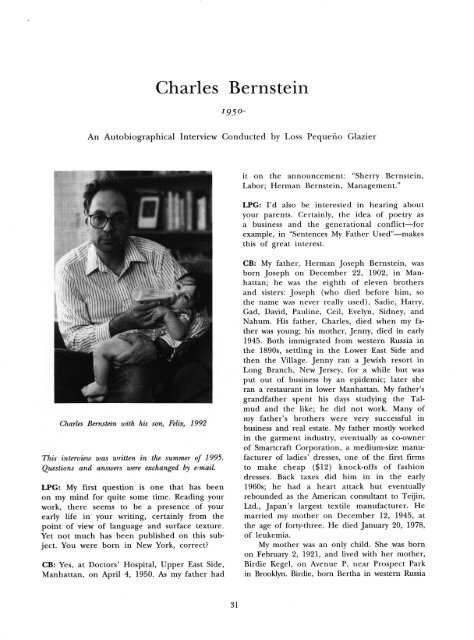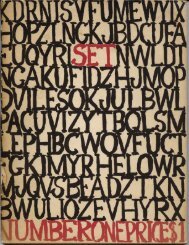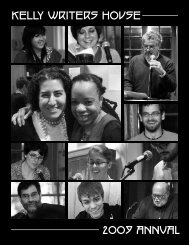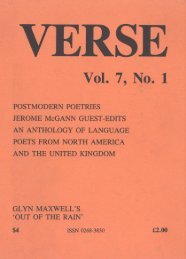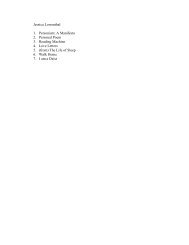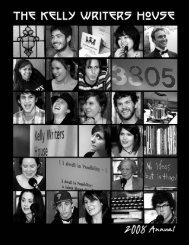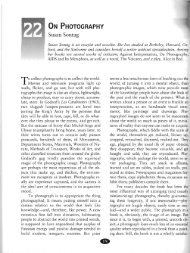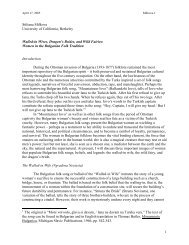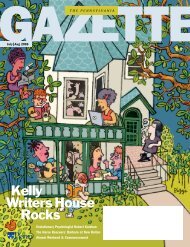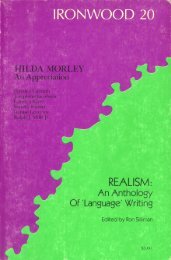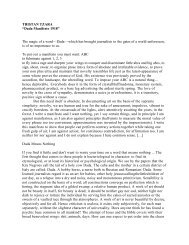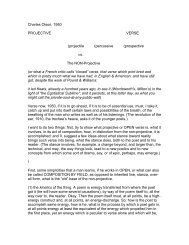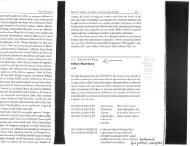Charles Bernstein - The Center for Programs in Contemporary Writing
Charles Bernstein - The Center for Programs in Contemporary Writing
Charles Bernstein - The Center for Programs in Contemporary Writing
Create successful ePaper yourself
Turn your PDF publications into a flip-book with our unique Google optimized e-Paper software.
<strong>Charles</strong> <strong>Bernste<strong>in</strong></strong><br />
I95 0 -<br />
An Autobiographical Interview Conducted by Loss Pequeno Glazier<br />
it on the announcement: "Sherry <strong>Bernste<strong>in</strong></strong>,<br />
Labor; Herman <strong>Bernste<strong>in</strong></strong>, Management."<br />
LPG: I'd also be <strong>in</strong>terested <strong>in</strong> hear<strong>in</strong>g about<br />
your parents. Certa<strong>in</strong>ly, the idea of poetry as<br />
a bus<strong>in</strong>ess and the generational conflict-<strong>for</strong><br />
example, <strong>in</strong> "Sentences My Father Used"-makes<br />
this of great <strong>in</strong>terest.<br />
<strong>Charles</strong> <strong>Bernste<strong>in</strong></strong> with his son, Felix, 1992<br />
This <strong>in</strong>terview was written <strong>in</strong> the summer of 1995.<br />
Questions and answers were exchanged bye-mail.<br />
LPG: My first question is one that has been<br />
on my m<strong>in</strong>d <strong>for</strong> quite some time. Read<strong>in</strong>g your<br />
work, there seems to be a presence of your<br />
early life <strong>in</strong> your writ<strong>in</strong>g, certa<strong>in</strong>ly from the<br />
po<strong>in</strong>t of view of language and surface texture.<br />
Yet not much has been published on this subject.<br />
You were born <strong>in</strong> New York, correct?<br />
CB: Yes, at Doctors' Hospital, Upper East Side,<br />
Manhattan, on April 4, 1950. As my father had<br />
CB: My father, Herman Joseph <strong>Bernste<strong>in</strong></strong>, was<br />
born Joseph on December 22, 1902, <strong>in</strong> Manhattan;<br />
he was the eighth of eleven brothers<br />
and sisters: Joseph (who died be<strong>for</strong>e him, so<br />
the name was never really used), Sadie, Harry,<br />
Gad, David, Paul<strong>in</strong>e, Ceil, Evelyn, Sidney, and<br />
Nahum. His father, <strong>Charles</strong>, died when my father<br />
was young; his mother, Jenny, died <strong>in</strong> early<br />
1945. Both immigrated from western Russia <strong>in</strong><br />
the 1890s, settl<strong>in</strong>g <strong>in</strong> the Lower East Side and<br />
then the Village. Jenny ran a Jewish resort <strong>in</strong><br />
Long Branch, New Jersey, <strong>for</strong> a while but was<br />
put out of bus<strong>in</strong>ess by an epidemic; later she<br />
ran a restaurant <strong>in</strong> lower Manhattan. My father's<br />
grandfather spent his days study<strong>in</strong>g the Talmud<br />
and the like; he did not work. Many of<br />
my father's brothers were very successful <strong>in</strong><br />
bus<strong>in</strong>ess and real estate. My father mostly worked<br />
<strong>in</strong> the garment <strong>in</strong>dustry, eventually as co-owner<br />
of Smartcraft Corporation, a medium-size manufacturer<br />
of ladies' dresses, one of the first firms<br />
to make cheap ($12) knock-offs of fashion<br />
dresses. Back taxes did him <strong>in</strong> <strong>in</strong> the early<br />
1960s; he had a heart attack but eventually<br />
rebounded as the American consultant to Teij<strong>in</strong>,<br />
Ltd., Japan's largest textile manufacturer. He<br />
married my mother on December 12, 1945, at<br />
the age of <strong>for</strong>ty-three. He died January 20, 1978,<br />
of leukemia.<br />
My mother was an only child. She was born<br />
on February 2, 1921, and lived with her mother,<br />
Birdie Kegel, on Avenue P, near Prospect Park<br />
<strong>in</strong> Brooklyn. Birdie, born Bertha <strong>in</strong> western Russia<br />
31
<strong>Charles</strong> <strong>Bernste<strong>in</strong></strong><br />
<strong>Contemporary</strong> Authors Autobiography Series, Volume 24<br />
<strong>in</strong> 1891, was abandoned by her father, Louis<br />
Stolitsky, who left <strong>for</strong> the United States. Her<br />
mother died, and she was sent, alone, to the<br />
U.S. when she was seven; she went to live with<br />
her father and stepmother, an unhappy circumstance<br />
<strong>for</strong> her. She married Edward Kegel <strong>in</strong><br />
1918. He was a successful Brooklyn real estate<br />
developer; he died of a streptococcus <strong>in</strong>fection<br />
<strong>in</strong> 1927.<br />
LPG: Given that both your parents had their<br />
roots <strong>in</strong> western Russia, might I ask specifically<br />
where <strong>in</strong> western Russia they came from? Importantly,<br />
did you grow up <strong>in</strong> an environment<br />
of spoken Yiddish or Russian? Do you<br />
have any familiarity with or memory of either<br />
of these languages?<br />
CB: I don't know the precise locations where<br />
my grandparents on my mother's side were born.<br />
My father's mother emigrated from Lithuania<br />
<strong>in</strong> about 1888, when she was <strong>in</strong> her early teens;<br />
his father emigrated from near Odessa. But this<br />
was ancient history to my father, who, after<br />
all, was born <strong>in</strong> New York, and I don't ever<br />
recall him talk<strong>in</strong>g about it, except <strong>in</strong> the oral<br />
history I did with him just be<strong>for</strong>e he died,<br />
which I had to listen to aga<strong>in</strong> <strong>in</strong> order to<br />
answer your question. My father did not dwell<br />
on such th<strong>in</strong>gs, at least not so as I could tell.<br />
Maybe it was that he didn't want to trouble<br />
me, or my brother and sister, about it; maybe<br />
he didn't th<strong>in</strong>k we'd be <strong>in</strong>terested; maybe he<br />
didn't want to th<strong>in</strong>k about it. <strong>The</strong> ma<strong>in</strong> th<strong>in</strong>g<br />
was that the family got out. In th<strong>in</strong>gs like this<br />
I found my father quite opaque: he didn't seem<br />
at all <strong>in</strong>trospective, although to say that is to<br />
reflect an enormous gulf between his own cultural<br />
circumstances and my own. In many ways<br />
my father seemed <strong>for</strong>eign to me, which is not<br />
to say unfamiliar; so it is all the more startl<strong>in</strong>g<br />
that I now f<strong>in</strong>d myself resembl<strong>in</strong>g him <strong>in</strong><br />
so many ways. <strong>The</strong> early poem that you mentioned,<br />
"Sentences My Father Used" (<strong>in</strong> Controll<strong>in</strong>g<br />
Interests), tried to th<strong>in</strong>k this through;<br />
much of this poem is based on the oral history<br />
I did with my father. (I'm sure I'm not<br />
alone <strong>in</strong> f<strong>in</strong>d<strong>in</strong>g Paul Auster's evocation of his<br />
<strong>The</strong> <strong>Bernste<strong>in</strong></strong>s: (from left) <strong>Charles</strong>, father, brother Edward, grandmother Birdie Kegel, mother, sister Leslie, 1953<br />
32
<strong>Contemporary</strong> Authors Autobiography Series, Volume 24<br />
<strong>Charles</strong> <strong>Bernste<strong>in</strong></strong><br />
father, <strong>in</strong> <strong>The</strong> Invention of Solitude, very close<br />
to my own experience of my father.)<br />
But equally, <strong>in</strong> the case of my mother and<br />
my grandmother, orig<strong>in</strong>s and roots were rarely<br />
a topic. <strong>The</strong> only grandparent I knew was my<br />
grandmother, who always lived very close by,<br />
but s<strong>in</strong>ce she came to America as a little girl,<br />
any echo of Yiddish was long gone. My mother<br />
says the only time she remembers hear<strong>in</strong>g her<br />
parents speak Yiddish was when they were say<strong>in</strong>g<br />
someth<strong>in</strong>g they didn't want her to understand.<br />
So, no, we had only American English<br />
at home, except <strong>for</strong> the occasional Friday night<br />
H ebrew prayer, although neither of my parents,<br />
nor my grandmother, knew much Hebrew,<br />
and what Hebrew was around was the product<br />
of religious education. That was the context <strong>in</strong><br />
which I learned a very little Hebrew <strong>in</strong> the<br />
couple of years be<strong>for</strong>e I turned thirteen, at<br />
Congregation Rodeph Shalom, a Re<strong>for</strong>m synagogue<br />
on the Upper West Side.<br />
LPG: But wouldn' t your father have been familiar<br />
with these languages? And if the background<br />
of your parents was not a l<strong>in</strong>guistic<br />
presence, wasn't it of importance <strong>in</strong> their political<br />
outlook?<br />
CB: My father probably spoke Yiddish as a kid,<br />
but there was no h<strong>in</strong>t of that <strong>in</strong> our household,<br />
except <strong>for</strong> the pervasive idiomatic <strong>in</strong>sistences<br />
that come naturally from any such l<strong>in</strong>guistic<br />
background and add texture and character to<br />
a person's speech. For example, my father would<br />
say "close the lights" or "take a haircut." I know<br />
there must be dozens more examples, but I<br />
can't br<strong>in</strong>g any to m<strong>in</strong>d right now, only keep<br />
hear<strong>in</strong>g him say<strong>in</strong>g, "Can't you kids close the<br />
lights? This place is lit up like Luna Park."<br />
My parents were assimilationists who nonetheless<br />
had a strong Jewish and later Zionist<br />
identification. As <strong>for</strong> many of their generation,<br />
this made <strong>for</strong> <strong>in</strong>terest<strong>in</strong>g contradictions. We were<br />
loosely kosher <strong>in</strong> the "beef fry" years; but <strong>in</strong><br />
other years the bacon fried plentifully and tasted<br />
sweet. Or we were kosher on Friday night when<br />
my Aunt Paul<strong>in</strong>e came to d<strong>in</strong>ner but not the<br />
rest of the week. Of course, on Rosh Hashana<br />
and Yom Kippur, when dozens of relatives descended<br />
on our apartment <strong>for</strong> gigantic and<br />
endless meals that I grew to dread <strong>for</strong> their<br />
tediousness, we were strictly kosher, with oncea-year<br />
Pesach plates and cakes made from matzoh<br />
meal. (Those who might "correctly" say you can't<br />
<strong>Charles</strong> with his mother, Sherry <strong>Bernste<strong>in</strong></strong>, 1954<br />
be a little bit kosher ignore the actual practice<br />
of Jewish ethnicity.) My father's family was<br />
associated with the Congregation Sherith Israel,<br />
the hundreds-year-old Spanish and Portuguese<br />
synagogue relocated across the street from our<br />
build<strong>in</strong>g; I occasionally attended the Orthodox<br />
services <strong>in</strong> their august ma<strong>in</strong> sanctuary. But as<br />
I say, <strong>for</strong> my parents the religious end of Judaism<br />
was less pronounced than a decisive, but<br />
at the same time mutable, ethnic identification.<br />
In politics my parents were liberal Democrats,<br />
but not especially political, though I can<br />
still remember hand<strong>in</strong>g out leaflets on Broadway<br />
and 74th Street <strong>for</strong> Adlai Stevenson when<br />
I was six. And while I am pleased to have<br />
been enlisted <strong>in</strong>to the Stevenson camp, and<br />
have' holes <strong>in</strong> my own shoes to prove it, my<br />
politics and that of my parents grew further<br />
apart. When I was a teenager, my father and I<br />
used to have vituperative exchanges at d<strong>in</strong>ner<br />
about Vietnam and about racism as he embraced<br />
Hubert Humphrey and I drifted leftward. More<br />
recently, my mother expressed her exasperation<br />
that I was the only Jew <strong>in</strong> New York who<br />
33
<strong>Charles</strong> <strong>Bernste<strong>in</strong></strong><br />
<strong>Contemporary</strong> Authors Autobiography Series, Volume 24<br />
supported Jesse Jackson, though I po<strong>in</strong>ted out<br />
to her that my brother had also voted <strong>for</strong> Jackson.<br />
(I center here on my father not only because<br />
it is more relevant to your question but<br />
also because my relation with my mother cont<strong>in</strong>ues<br />
<strong>in</strong> a way that makes me less apt to characterize<br />
it.)<br />
In any case, my father's concerns were centered<br />
foursquarely on success, and too often,<br />
and very pa<strong>in</strong>fully <strong>for</strong> him, failure <strong>in</strong> bus<strong>in</strong>ess.<br />
As he put it, "One can achieve success and<br />
happ<strong>in</strong>ess if the right priorities are valued."<br />
"<strong>The</strong> right priorities" was not a particularly elastic<br />
concept <strong>for</strong> him, and <strong>in</strong> this he represents,<br />
more than less, a new-immigrant generation that<br />
didn't have the leisure to question what their<br />
very hard work made possible <strong>for</strong> my generation.<br />
LPG: Louis Zukofsky and <strong>Charles</strong> Reznikoff are<br />
writers who have been consistently of great <strong>in</strong>terest<br />
to you <strong>in</strong> their ability to "create a new<br />
world <strong>in</strong> English, a new word <strong>for</strong> what they<br />
called America." How does the experience of<br />
your family <strong>in</strong><strong>for</strong>m your read<strong>in</strong>g of these authors?<br />
I was wonder<strong>in</strong>g if, especially <strong>in</strong> Reznikoffs<br />
work, other than the literary and documentary<br />
qualities, there are specific events or issues that<br />
you f<strong>in</strong>d particularly resonant <strong>in</strong> your personal<br />
history?<br />
CB: Yes, my relation to Zukofsky and Reznikoff<br />
is tempered by this history. Zukofsky and my<br />
father were virtually the same age and grew<br />
up near each other, but there seem few other<br />
po<strong>in</strong>ts <strong>in</strong> common. Zukofsky and Reznikoff <strong>in</strong>terrogated<br />
and resisted the very ideologies that<br />
my father accepted as the givens of American<br />
life. And both had gone well beyond the high<br />
school education my father possibly completed.<br />
(My mother's education was not much more<br />
extensive, though she had a few years of "f<strong>in</strong>ish<strong>in</strong>g<br />
school" after high school. But that is a<br />
different story.)<br />
My father certa<strong>in</strong>ly had no sympathy <strong>for</strong><br />
artists, whom he thought of as frauds (<strong>in</strong> the<br />
case of "modern" art) or slackers (as <strong>in</strong> the<br />
case of his own rabb<strong>in</strong>ic grandfather, whom<br />
he saw as someth<strong>in</strong>g of a family black sheep) .<br />
And we grew up surrounded by popular American<br />
culture but very little <strong>in</strong> the way of literature<br />
or art. While my parents hardly even played<br />
music on the radio, the newspapers-the Times,<br />
the Post, the Daily News, and later Women's Wear<br />
<strong>Charles</strong> with his father <strong>in</strong> Italy, 1966<br />
Daily-loomed large. We did have books, but<br />
they were mostly <strong>in</strong>herited popular novels of<br />
the previous decades supplemented by a few<br />
contemporary best-sellers or condensed books<br />
Uust add boil<strong>in</strong>g water). My mother had decorated<br />
a large part of our apartment <strong>in</strong> a very<br />
<strong>for</strong>mal French colonial style. <strong>The</strong> large liv<strong>in</strong>g<br />
room, <strong>for</strong> example, was <strong>for</strong> company-not <strong>for</strong><br />
everyday life. In this context, books become<br />
decor, as with a complete set of Rusk<strong>in</strong>'s work<br />
bought by the yard <strong>for</strong> a beautiful antique<br />
bookshelf. As far as I can tell, the Rusk<strong>in</strong>' was<br />
never opened dur<strong>in</strong>g my childhood, though I<br />
do appreciate the fact that it presided over us,<br />
<strong>in</strong> some sublim<strong>in</strong>al way.<br />
Zukofsky and Reznikoff are important to me<br />
because they suggest a totally different sense<br />
of Jewishness than anyth<strong>in</strong>g I knew of <strong>in</strong> the<br />
1950s, someth<strong>in</strong>g along the l<strong>in</strong>es that Isaac<br />
Deutcher, writ<strong>in</strong>g from a Left perspective, describes<br />
as the "non-Jewish Jew," but also part<br />
of the heterodox context chartered by Jerome<br />
Rothenberg <strong>in</strong> A Big Jewish Book. This is someth<strong>in</strong>g<br />
of a circus sideshow to "serious" Juda-<br />
34
<strong>Contemporary</strong> Authors Autobiography Series, Volume 24<br />
<strong>Charles</strong> <strong>Bernste<strong>in</strong></strong><br />
ism, with open<strong>in</strong>g acts by Maimonides and the<br />
Baal Shem Tov, Sp<strong>in</strong>oza and He<strong>in</strong>e, or, <strong>in</strong> the<br />
ma<strong>in</strong> tent, Groucho and Harpo and Chico Marx,<br />
Lenny Bruce, Woody Allen, Bob Dylan. While<br />
I never mentioned Jewishness <strong>in</strong> my college piece<br />
on Ste<strong>in</strong> and Wittgenste<strong>in</strong> (and the subject is<br />
largely unmentioned <strong>in</strong> each of their works),<br />
it is, of course, an obvious po<strong>in</strong>t of contact as<br />
well as a crucial, if implicit, reference po<strong>in</strong>t<br />
<strong>for</strong> me.<br />
But let me end this str<strong>in</strong>g of thoughts by<br />
quot<strong>in</strong>g a passage from Amos Oz that, by a<br />
delicious co<strong>in</strong>cidence, Eric Sel<strong>in</strong>ger e-mailed while<br />
I was answer<strong>in</strong>g your question:<br />
Now suppose a new Kafka is grow<strong>in</strong>g up<br />
right now, here <strong>in</strong> San Francisco, Cali<strong>for</strong>nia.<br />
Suppose he is fourteen-years-old right<br />
now. Let's call him Chuck <strong>Bernste<strong>in</strong></strong>. Let's<br />
assume that he is every bit of a genius as<br />
Kafka was <strong>in</strong> his time. His future must, as<br />
I see it, d epend on an uncle <strong>in</strong> Jerusalem<br />
or an expe rience by the Dead Sea, or a<br />
cous<strong>in</strong> <strong>in</strong> a kibbutz or someth<strong>in</strong>g <strong>in</strong>spired<br />
by the Israeli live drama. Otherwise, with<br />
the exception of the possibility that he is<br />
grow<strong>in</strong>g up among the ultra-Orthodox, he<br />
will be an American writer of Jewish orig<strong>in</strong>-not<br />
a Jewish American writer. He may<br />
become a new Faulkner, but not a new Kafka.<br />
("Imag<strong>in</strong><strong>in</strong>g the Other: 1," <strong>in</strong> <strong>The</strong> Writer <strong>in</strong><br />
the Jewish Community: An Israeli-North American<br />
Dialogue, ed. Richard Siegel and Tamar<br />
Safer [Associated University Presses, 1993],<br />
122.)<br />
done s<strong>in</strong>ce, political and poetic, has changed<br />
this not at all. For poetry, after all, is the ultimate<br />
small bus<strong>in</strong>ess, requir<strong>in</strong>g a careful keep<strong>in</strong>g<br />
of accounts to stay afloat. Not to mention<br />
all that "small press" stuff like distribution, promotion,<br />
and book manufactur<strong>in</strong>g. That is to<br />
say, I have wanted to br<strong>in</strong>g poetry <strong>in</strong>to the<br />
"petty, commercial," <strong>in</strong>deed material and social<br />
world of everyday life rather than make it a<br />
space <strong>in</strong> which I could rema<strong>in</strong> "free" of these<br />
th<strong>in</strong>gs, or, better to say, cha<strong>in</strong>ed to an illusion<br />
of such freedom.<br />
Because my father and his brothers were<br />
"self-made" men, they believed that theirs was<br />
the only practical, and there<strong>for</strong>e right, course<br />
<strong>in</strong> life. <strong>The</strong> proof was that it had worked <strong>for</strong><br />
them, and, as far as I can tell, they never<br />
came to understand how the lives so created<br />
could look so hollow, if not misguided, to at<br />
least a few of the next generation. To start a<br />
bus<strong>in</strong>ess on noth<strong>in</strong>g, as my father had done<br />
<strong>in</strong> the 1920s, when he bought and resold short<br />
end pieces of fabric rolls that would otherwise<br />
have been discarded ("the trim, the waste"),<br />
meanwhile be<strong>in</strong>g weekly hounded by his successful<br />
brother to repay a small loan, sets <strong>in</strong><br />
place a pattern of anxiety and dim<strong>in</strong>ished expectations<br />
<strong>for</strong> the, what? "quality" of life, if<br />
aesthetics can be def<strong>in</strong>ed, so, that doesn't eas-<br />
It seems to me this tortured and reductive conception<br />
of identity is just what the tradition of<br />
writers I've mentioned have refused. And it is<br />
<strong>in</strong> explor<strong>in</strong>g and realiz<strong>in</strong>g alternative identity<br />
<strong>for</strong>mations that at least one sliver of a Jewish<br />
tradition may be of use; <strong>in</strong> this, Kafka is our<br />
dark and implod<strong>in</strong>g star.<br />
LPG: As your father was a manager In the<br />
garment <strong>in</strong>dustry, how did this reflect upon your<br />
own sense of self while grow<strong>in</strong>g up? (In other<br />
words, his work could have seemed petty or<br />
commercial compared to your own engagement<br />
with social concerns, or you may have felt pressure<br />
to become a part of the "cottage" <strong>in</strong>dustry.)<br />
Did you have to fight pressure to participate<br />
<strong>in</strong> your father's commercial enterprise?<br />
CB: One day I woke up and found myself metamorphosed<br />
<strong>in</strong>to a t<strong>in</strong>y bus<strong>in</strong>essman. All that I have<br />
At Harvard College, Thayer Hall, freshman year, 1969<br />
35
<strong>Charles</strong> <strong>Bernste<strong>in</strong></strong><br />
<strong>Contemporary</strong> Authors Autobiography Series, Volume 24<br />
ily, if ever, unravel. <strong>The</strong> bus<strong>in</strong>ess isn't someth<strong>in</strong>g<br />
you do to make money; it's what you<br />
do, who you are. Family, like cultural or social<br />
activities, is an extended lunch break.<br />
And what went with this, at least <strong>for</strong> my<br />
father, was an unquestion<strong>in</strong>g belief not only<br />
<strong>in</strong> progress and <strong>in</strong>dustry <strong>in</strong> the abstract but<br />
also <strong>in</strong> the absolute value of <strong>in</strong>dustrialization,<br />
Western Civilization, the market system, and technology<br />
that the catastrophes of the Second World<br />
War did not, f<strong>in</strong>ally, touch. I imag<strong>in</strong>e that the<br />
1920s and 1930s passed my father by as he<br />
worked, s<strong>in</strong>gly and s<strong>in</strong>gle-m<strong>in</strong>dedly, to establish<br />
himself, to create his own estate. That came,<br />
f<strong>in</strong>ally, dur<strong>in</strong>g the war, and he married <strong>for</strong> the<br />
first time <strong>in</strong> the very first year of the postwar<br />
era, and at pretty much the age I am now,<br />
start<strong>in</strong>g a family when most men of his generation<br />
had grown-up kids. He came the closest<br />
to his American Dream <strong>in</strong> the 1950s. It<br />
was as if his life had led him to this decade<br />
of prosperity and surface tranquillity, and he<br />
rema<strong>in</strong>ed, <strong>for</strong> the rest of his life, its unshakable<br />
constituent.<br />
But here's where the ethnic ethos comes<br />
<strong>in</strong> aga<strong>in</strong>: it wasn't <strong>for</strong> us, the children, to cont<strong>in</strong>ue<br />
<strong>in</strong> bus<strong>in</strong>ess but to become professionals,<br />
free from the gr<strong>in</strong>d<strong>in</strong>g labor and terroriz<strong>in</strong>g<br />
uncerta<strong>in</strong>ty of bus<strong>in</strong>ess. <strong>The</strong> pressure, then, was<br />
to be a physician or lawyer; my own choice, at<br />
least <strong>in</strong>itially toward downward social mobility,<br />
was rankl<strong>in</strong>g and fundamentally unacceptable<br />
and must have made me seem ungrateful and<br />
disrespectful of the whole struggle of the bus<strong>in</strong>ess,<br />
of his life. I know my father often compla<strong>in</strong>ed<br />
about my lack of respect and certa<strong>in</strong>ly<br />
had no respect to spare <strong>for</strong> my choices. I pretty<br />
much ignored the pressure, which is to say,<br />
adamantly rejected the life so envisioned <strong>for</strong><br />
me, and never really looked back.<br />
LPG: Tell me about your brothers and sisters.<br />
Did you grow up <strong>in</strong> New York? What was your<br />
early life like?<br />
CB: I have a brother, Edward Amber (changed<br />
his last name), born October 8, 1946, and a<br />
sister, Leslie Gross (married to Donald Gross),<br />
Susan Bee Laufer, at the time she and <strong>Charles</strong> <strong>Bernste<strong>in</strong></strong> first met, with a pa<strong>in</strong>t<strong>in</strong>g of her by<br />
Miriam Laufer <strong>in</strong> the background, 1969<br />
36
ContempCffary AuthCffs Autobiography Series, Volume 24<br />
<strong>Charles</strong> <strong>Bernste<strong>in</strong></strong><br />
<strong>Charles</strong> and Susan, about 1972<br />
born June 16, 1948. My parents moved from<br />
81st Street just west of Columbus to 101 Central<br />
Park West just be<strong>for</strong>e 1 was born; my mother still<br />
lives <strong>in</strong> the same luxurious twelfth-floor apartment,<br />
which overlooks Central Park. Classic Upper West<br />
Side.<br />
Like my sister and brother, 1 went to a<br />
self-congratulat<strong>in</strong>g "progressive" school of the<br />
Deweyite persuasion, the Ethical Culture School.<br />
1 was there k<strong>in</strong>dergarten to sixth grade. None<br />
of us did very well there, and 1 <strong>in</strong>tensely disliked<br />
the social, cultural, and <strong>in</strong>tellectual environment.<br />
This was a place that, even if you<br />
were "com<strong>for</strong>table," the other kids, and their<br />
parents, made you feel like you were a pauper.<br />
On the school's part, they did not th<strong>in</strong>k<br />
much of me, as 1 was repeatedly told: my penmanship<br />
and spell<strong>in</strong>g were abysmal; 1 was slow<br />
to read and <strong>in</strong> constant need of remedy <strong>in</strong><br />
the <strong>for</strong>m of remedial groups; 1 did not socialize<br />
right; my appearance was somewhat ajar. 1<br />
give a sense of this <strong>in</strong> "Stand<strong>in</strong>g Target" <strong>in</strong><br />
Controll<strong>in</strong>g Interests, where 1 quote some reports<br />
from Fieldston day camp, which was run by<br />
Ethical. My favorite th<strong>in</strong>g to do was stay home;<br />
some years 1 missed as many as <strong>for</strong>ty days. And<br />
at home, there was the chance <strong>for</strong> reverie, <strong>for</strong><br />
sleep<strong>in</strong>g late, <strong>for</strong> mak<strong>in</strong>g tuna fish sticks spr<strong>in</strong>kled<br />
with paprika, <strong>for</strong> watch<strong>in</strong>g daytime TV. 1 read<br />
TV Guide religiously <strong>in</strong> those days and knew<br />
all the panelists on the celebrity game shows,<br />
all the actors on the sitcoms, and all the comedy<br />
shows from the early 1950s that 1 had missed<br />
the first time around.<br />
1 liked TV and hang<strong>in</strong>g out at home-but<br />
not sports! 1 was the k<strong>in</strong>d of kid that was always<br />
picked last <strong>for</strong> the team and put <strong>in</strong> right field<br />
or its equivalent. By the time 1 was <strong>in</strong> high<br />
school (after a brief flirtation with soccer, all<br />
dressed <strong>in</strong> black to play goalie, <strong>in</strong> junior high<br />
school), 1 used to put my hands <strong>in</strong> my pockets<br />
whenever 1 was thrust <strong>in</strong>to a game. 1 never<br />
played catch with any member of my family,<br />
but we used to go out to Ch<strong>in</strong>ese d<strong>in</strong>ners on<br />
Thanksgiv<strong>in</strong>g and Christmas, and 1 liked that.<br />
1 can still remember my delight at the reaction<br />
of my sixth-grade teacher, Miss Green,<br />
when 1 sported a button that read "I may look<br />
<strong>in</strong>terested but I'm just be<strong>in</strong>g polite." I've always<br />
tried to be polite. But 1 did like one<br />
th<strong>in</strong>g about Miss Green's class: <strong>for</strong> months, it<br />
seems to me, we read, always start<strong>in</strong>g from the<br />
first page, <strong>The</strong> Old Curiosity Shop: "Night is generally<br />
my time <strong>for</strong> walk<strong>in</strong>g." I loved that and<br />
could, no matter how awkward 1 otherwise felt<br />
<strong>in</strong> the class, fall <strong>in</strong>to that prose and be transported.<br />
1 was not admitted to Fieldston, Ethical's<br />
upper school, a rout<strong>in</strong>e matter <strong>for</strong> my classmates,<br />
and went on, to my great relief, to a<br />
small, highly conventional, private school,<br />
Frankl<strong>in</strong>, <strong>for</strong> seventh and eighth grades, and it<br />
was there that the worlds of history and literature<br />
opened up <strong>for</strong> me. What I hated about<br />
Ethical was that you never received grades but<br />
were given pop psychology reports about your<br />
development and social <strong>in</strong>tegration. At Frankl<strong>in</strong>,<br />
there were concrete tasks assigned and measured<br />
by tests; the right attitude was less important<br />
than the right facts. Certa<strong>in</strong>ly, there<br />
were some tough times adjust<strong>in</strong>g. I wanted to<br />
do really well and can remember cheat<strong>in</strong>g a<br />
few times on tests <strong>in</strong> seventh grade, as if that<br />
would prove to myself that I knew a th<strong>in</strong>g or<br />
two. Actually, the academic side of the school<br />
became the great focus of my life as I began<br />
to read the history of Greece or Ch<strong>in</strong>a and<br />
especially to read literature. I remember a great,<br />
thick collection of <strong>in</strong>ternational short stories,<br />
with a gray cover, that I got while at Frankl<strong>in</strong>,<br />
and the excitement I felt when I read, even if<br />
1 could not fully understand, Kafka, Genet,<br />
Camus, and especially Sartre. <strong>The</strong>n one day <strong>in</strong><br />
seventh or eighth grade an English teacher<br />
37
<strong>Charles</strong> <strong>Bernste<strong>in</strong></strong><br />
<strong>Contemporary</strong> Authors Autobiography Series, Volume 24<br />
named Francis Xavier Walker wrote on the board,<br />
"Bun is such a sad word is it not, and man is<br />
not much better is it." He said it was by Samuel<br />
Beckett, and that he liked the way it sounded,<br />
the way it focused on the sound of the words<br />
man and bun. That was k<strong>in</strong>d of like hear<strong>in</strong>g<br />
about the theory of relativity. I was hooked; <strong>in</strong><br />
fact years seemed to go by when all I wanted<br />
to do was stay <strong>in</strong> my small room overlook<strong>in</strong>g<br />
the park, which at that po<strong>in</strong>t I rarely stepped<br />
<strong>in</strong>to, and read books and watch TV.<br />
LPG: Yes, you have written that "My work is<br />
as <strong>in</strong>fluenced by Dragnet as by Proust." This<br />
comment, of course, is <strong>in</strong>dicative of the sources<br />
of "<strong>in</strong><strong>for</strong>mation" we have <strong>in</strong> a media culture<br />
like ours. Did your <strong>in</strong>terest <strong>in</strong> the classroom<br />
experience change when you went to high<br />
school?<br />
CB: Well, I always loved those clipped voiceovers.<br />
But I have to say, the <strong>in</strong>fluence of Dragnet<br />
was noth<strong>in</strong>g compared to the Manhattan<br />
Yellow Pages.<br />
I spent high school at a terrific school, the<br />
Bronx High School of Science, where, <strong>in</strong> my<br />
senior year, I edited the school newspaper, Science<br />
Survey. Science was a "specialized" school, someth<strong>in</strong>g<br />
like today's magnet schools, but pretty<br />
much the only such schools <strong>in</strong> New York, <strong>in</strong> the<br />
Sputnik era, were science schools, so my <strong>in</strong>terest<br />
<strong>in</strong> go<strong>in</strong>g there was <strong>for</strong> the quality of the school<br />
and not <strong>for</strong> the science and math, which I never<br />
had much <strong>in</strong>terest <strong>in</strong>. Strangely, I always did very<br />
well on standardized tests of physics, chemistry,<br />
geometry, algebra, and the like, but I never felt<br />
like I "got" it. My <strong>in</strong>terests were literature, history,<br />
social studies. Indeed, I coord<strong>in</strong>ated our high<br />
school Forum series, which sponsored speakers<br />
every month; I remember <strong>in</strong> particular tak<strong>in</strong>g<br />
a cab back <strong>in</strong>to the city with James Farmer of<br />
CORE [Congress of Racial Equality]. <strong>The</strong>re were<br />
great, even <strong>in</strong>spired, English teachers at Science.<br />
<strong>The</strong> one I was closest to was Richard<br />
Fe<strong>in</strong>gold, who gave vivid lectures on Hamlet,<br />
Jonathan Edwards, Emily Dick<strong>in</strong>son, and Robert<br />
Frost. Fe<strong>in</strong>gold is now a professor of eighteenth-century<br />
poetry at Berkeley. He came to<br />
my read<strong>in</strong>g there a few months back-I hadn't<br />
seen him <strong>in</strong> over twenty-five years.<br />
Dur<strong>in</strong>g high school I started go<strong>in</strong>g to the<br />
movies a lot, and also to the theater. I grew<br />
up with the big musicals of the period, but at<br />
this po<strong>in</strong>t I got <strong>in</strong>terested <strong>in</strong> P<strong>in</strong>ter and im-<br />
ports from the Royal Shakespeare Company, Peter<br />
Brooks's productions, but also off-Broadway stuff:<br />
I can still remember be<strong>in</strong>g riveted by Leroi<br />
Jones's Dutchman. You know, the whole world<br />
of "high culture" and modernism opened up<br />
<strong>for</strong> me and I was always mak<strong>in</strong>g lists of what I<br />
should know about. I remember send<strong>in</strong>g <strong>for</strong><br />
WQXR's Mart<strong>in</strong> Bookspan's list of the one hundred<br />
most important classical records and then<br />
check<strong>in</strong>g them out at the library or buy<strong>in</strong>g them.<br />
I mean, I had no <strong>in</strong><strong>for</strong>mation about this k<strong>in</strong>d<br />
of th<strong>in</strong>g but I was fasc<strong>in</strong>ated. My parents, like<br />
I said, didn' t listen to music or read very much<br />
beyond the newspapers and magaz<strong>in</strong>es (though<br />
my mother would occasionally read a bestsell<strong>in</strong>g<br />
novel), but they did do th<strong>in</strong>gs like get<br />
me a subscription to Leonard <strong>Bernste<strong>in</strong></strong>'s Young<br />
People's Concerts with the New York Philharmonic,<br />
and they were happy to buy me tickets<br />
<strong>for</strong> lots of other concerts all over the city, which<br />
I generally went to by myself. When I was sixteen,<br />
my father, sister, and I went to Europe.<br />
We visited London, Paris, Florence, Rome, and<br />
Berl<strong>in</strong>. In London I went to plays every night<br />
and sawall the museums, all the sights. It was<br />
thrill<strong>in</strong>g, although it was quite difficult to travel<br />
with my father, and the deep generational and<br />
political divisions between us were never so<br />
apparent.<br />
LPG: When did this divergent cultural <strong>in</strong><strong>for</strong>mation<br />
beg<strong>in</strong> to coalesce <strong>for</strong> you?<br />
CB: Everyth<strong>in</strong>g fell <strong>in</strong>to place <strong>in</strong> the mid-1960s:<br />
those great movies from Fell<strong>in</strong>i and Antonioni<br />
and Godard, Phil Ochs and Bob Dylan and<br />
Richie Havens, and much that holds up far<br />
less well these days (I still have my Procol Harem<br />
and Incredible Str<strong>in</strong>g Band records), the Be<br />
Ins, the smoke from loose jo<strong>in</strong>ts. While I had<br />
a Bar Mitzvah at thirteen and was, at the time,<br />
quite religious, all that started to come apart<br />
with<strong>in</strong> a year or two. <strong>The</strong> civil rights movement,<br />
the sit-<strong>in</strong>s, the Mississippi Freedom summer,<br />
Mart<strong>in</strong> Luther K<strong>in</strong>g, and then the Vietnam<br />
War all <strong>in</strong>creas<strong>in</strong>gly focused my politics. I<br />
tuned to WBAI, Pacifica radio <strong>in</strong> New York. I<br />
was around <strong>for</strong> the demonstrations dur<strong>in</strong>g the<br />
Columbia University strike dur<strong>in</strong>g my senior year<br />
<strong>in</strong> high school, and also <strong>in</strong>volved with demonstrations<br />
at my high school (aga<strong>in</strong>st regulations<br />
prohibit<strong>in</strong>g "shirts without colors and dungareetype<br />
pants," among other th<strong>in</strong>gs).<br />
38
<strong>Contemporary</strong> Authors Autobiography Series, Volume 24<br />
<strong>Charles</strong> <strong>Bernste<strong>in</strong></strong><br />
I've never shaken the shock and sadness I<br />
felt when Mart<strong>in</strong> Luther K<strong>in</strong>g was assass<strong>in</strong>ated;<br />
it was my eighteenth birthday. In the summer<br />
of 1968, after a trip I took by myself to<br />
Scand<strong>in</strong>avia (I wanted to see the fjords) and<br />
also to Greece (where you could still get by<br />
on a couple of dollars a day), I returned to<br />
the U.S. to go to the Chicago demonstrations<br />
dur<strong>in</strong>g the Democratic National Convention. Like<br />
everyone else there, I got gassed, got "radicalized"<br />
(aga<strong>in</strong>), and got to hear Allen G<strong>in</strong>sberg chant<br />
"Om" to the crowd.<br />
I met Susan (Bee Laufer) <strong>in</strong> high schoolat<br />
a party <strong>in</strong> Greenwich Village on February 9,<br />
1968. Her parents had both grown up <strong>in</strong> Berl<strong>in</strong>,<br />
had left <strong>in</strong> 1936 on a youth aliyah to Palest<strong>in</strong>e<br />
when they were teenagers, and had met<br />
<strong>in</strong> Jerusalem. <strong>The</strong>y came to New York <strong>in</strong> 1948-<br />
Sigmund keep<strong>in</strong>g the same job, until a couple<br />
of years ago, and the same apartment all this<br />
while. Susan's parents were both artists: her<br />
mother, Miriam, a wonderful, unjustly unrecognized,<br />
pa<strong>in</strong>ter do<strong>in</strong>g 1950s-style expressionist<br />
pa<strong>in</strong>t<strong>in</strong>gs of, among other th<strong>in</strong>gs, female nudes,<br />
and a later series pa<strong>in</strong>ted on car w<strong>in</strong>dshields.<br />
<strong>The</strong> Laufers, who had been sympathetic with<br />
the Left when <strong>in</strong> Palest<strong>in</strong>e, were a remarkable<br />
political and cultural contrast to my own family.<br />
With Susan, I started to go to the art galleries<br />
and then also up to Prov<strong>in</strong>cetown.<br />
LPG: <strong>The</strong>n you attended Harvard, correct? This<br />
must have been quite a change from the cultural<br />
and social excitement of Manhattan. Was<br />
this a satisfy<strong>in</strong>g experience?<br />
CB: I found Harvard a rather unpleasant place<br />
and was shocked by the snobbism and arrogance.<br />
It was unbelievable to me that the "men"<br />
at the Freshman Commons would cl<strong>in</strong>k their<br />
glasses when a woman walked <strong>in</strong>to the hall. If<br />
Katie Roiphe and other post-fem<strong>in</strong>ists would like<br />
to go back to this time, they can have it. This<br />
was the last year that you had to wear a tie<br />
and jacket to d<strong>in</strong>ner; the re were parietals <strong>in</strong><br />
effect <strong>in</strong> the still all-male dorms. I found the<br />
environment suffocat<strong>in</strong>g and depress<strong>in</strong>g. And<br />
liv<strong>in</strong>g <strong>in</strong> Harvard Yard was like liv<strong>in</strong>g <strong>in</strong> a zoo-<br />
LYME<br />
TOWN CLERK<br />
HOURS<br />
MOI'4+FRl q·3, ,-q<br />
WED q -3<br />
Wedd<strong>in</strong>g photo-<strong>Charles</strong> <strong>Bernste<strong>in</strong></strong> and Susan Bee Laufer,<br />
Lyme, New Hampshire, August 17, 1977<br />
39
<strong>Charles</strong> <strong>Bernste<strong>in</strong></strong><br />
<strong>Contemporary</strong> Authors Autobiography Series, Volume 24<br />
with all the tourists tak<strong>in</strong>g pictures of you and<br />
your environs when you poked your head out<br />
the door.<br />
I have to say, it was an eye-opener to realize<br />
how few of my classmates actually cared<br />
about the arts, literature, history, though after<br />
a while it was possible to f<strong>in</strong>d like-m<strong>in</strong>ded souls.<br />
Still, Harvard students, on the whole, seemed<br />
contemptuous of the arts and of learn<strong>in</strong>g <strong>in</strong> a<br />
way I never encountered at Bronx Science; I<br />
soon came to realize that the enhanced admission<br />
<strong>for</strong> students from elite prep schools pulled<br />
down the <strong>in</strong>tellectual, cultural, and moral level<br />
of the school, just as it does the country. Talk<br />
about affirmative action. In my year only one<br />
student from all the public schools of Chicago<br />
got <strong>in</strong>to Harvard, while 40 percent of the classes<br />
at the elite schools were admitted. I got a real<br />
sense of where this was all go<strong>in</strong>g when I had<br />
a job do<strong>in</strong>g childcare at a twenty-fifth reunion.<br />
At the Boston Pops concert, the middle-aged<br />
Harvard grads gave a stand<strong>in</strong>g ovation to an<br />
orchestral version of "Ra<strong>in</strong> Drops Keep Fall<strong>in</strong>g<br />
on My Head." I keep that image <strong>in</strong> m<strong>in</strong>d when<br />
I th<strong>in</strong>k of our "elite" <strong>in</strong>stitutions and what they<br />
are do<strong>in</strong>g <strong>for</strong> our culture.<br />
I was not alone <strong>in</strong> my distress. In my freshman<br />
year I became <strong>in</strong>volved <strong>in</strong> the antiwar<br />
movement, even if my somewhat anarchic and<br />
pacifist politics did not sit well with some factions<br />
of SDS [Students <strong>for</strong> a Democratic Society].<br />
I was impressed by many of the ideas of<br />
the New Left, and especially by the Port Huron<br />
Statement and the concept of participatory democracy.<br />
And I certa<strong>in</strong>ly thought someth<strong>in</strong>g had to be<br />
done to stop the war. I was <strong>in</strong> and out of University<br />
Hall dur<strong>in</strong>g the 1969 occupation, but when<br />
the police were called, I was <strong>in</strong> bed, right next<br />
door to the occupied build<strong>in</strong>g. I quickly slipped<br />
<strong>in</strong>to the build<strong>in</strong>g and was arrested <strong>for</strong> trespass<strong>in</strong>g<br />
<strong>in</strong> a case that was ultimately dismissed. Despite<br />
the dismissal <strong>in</strong> a court of law, I was put under<br />
<strong>in</strong>def<strong>in</strong>ite "warn<strong>in</strong>g" by Harvard's Committee of<br />
Rights and Responsibilities ("We're right, you're<br />
responsible"). I have been amused and appalled to<br />
see how <strong>in</strong> the <strong>in</strong>terven<strong>in</strong>g years some of my classmates<br />
who did not take a stand of pr<strong>in</strong>ciple aga<strong>in</strong>st<br />
the war have parlayed their own failures of<br />
political judgment <strong>in</strong>to a source of pundit power:<br />
I am th<strong>in</strong>k<strong>in</strong>g here of James Fallows and Michael<br />
K<strong>in</strong>sley.<br />
LPG: <strong>The</strong> political <strong>in</strong><strong>for</strong>ms your work on many<br />
levels. It seems relevant here, given your expe-<br />
rience with politics at the Columbia and Harvard<br />
strikes and the (one would presume extremely<br />
significant) Chicago demonstrations, to ask<br />
whether you were consider<strong>in</strong>g political activism<br />
as a future <strong>in</strong>volvement. What <strong>in</strong>fluenced you<br />
<strong>in</strong> this regard? And wouldn't "literary" action<br />
be considered less than effective? How do you<br />
reconcile this?<br />
CB: I never wanted to be a professional activist,<br />
although <strong>in</strong> some ways maybe that is what<br />
I've become. I always thought protest was <strong>for</strong><br />
the <strong>in</strong><strong>for</strong>med citizen, tak<strong>in</strong>g the time out of<br />
her or his everyday life, time hard to spare<br />
but required by the very demands of citizenship.<br />
<strong>The</strong> demonstrations of the 1960s and 1970s<br />
were exhilarat<strong>in</strong>g, and I dearly miss that level<br />
of idealism and activism <strong>in</strong> the U.S., dearly<br />
miss the time when the political and cultural<br />
Left, or shades of it, set the national agenda<br />
rather than the religious Right, as now seems<br />
the case. Still, I was amazed at a reunion held<br />
on the twentieth anniversary of the Harvard<br />
strike how many of the people spoke of those<br />
events as the high po<strong>in</strong>t of their life. I th<strong>in</strong>k<br />
my own preoccupations were and are elsewhere.<br />
It seems like it can never be stated often<br />
enough that the claims made <strong>for</strong> "the politics<br />
of poetic <strong>for</strong>m" are aga<strong>in</strong>st the idea of the<br />
political efficacy of poetry. If anyth<strong>in</strong>g, the politics<br />
of the poetic <strong>for</strong> which I have spoken mute<br />
any such efficacy. So then the question becomes,<br />
how do you reconcile thought and action, or<br />
second thoughts and action, reflection and decision?<br />
<strong>The</strong> answer is, as best you can. Poetry<br />
explores crucial questions about the core values<br />
that constitute a polis; it allows <strong>for</strong> re<strong>for</strong>-<br />
<strong>Charles</strong> and Susan, 1978<br />
40
<strong>Contemporary</strong> Authors Autobiography Series, Volume 24<br />
<strong>Charles</strong> <strong>Bernste<strong>in</strong></strong><br />
Sulfur Conference, Ypsilanti, Michigan, 1988: (top row, from left) James Clif<strong>for</strong>d,<br />
Michael Palmer, Clark Coolidge, Eliot We<strong>in</strong>berger; (middle, from left) Clayton Eshleman,<br />
Caryl Eshleman, <strong>Charles</strong> <strong>Bernste<strong>in</strong></strong>, Rachel Blau DuPlessis, John Yau; (bottom, from left)<br />
Jerome Rothenberg, Jed Rasula, Marjorie Perloff<br />
mulations of the basic issues of political policy<br />
and the means we use to represent them. It<br />
may even mock what men, and women, hold<br />
most dear, so that <strong>in</strong> our laughter we may<br />
come to terms with what we cl<strong>in</strong>g to.<br />
Poetry thickens discussion, refuses reductive<br />
<strong>for</strong>mulations. It s<strong>in</strong>gs of values not measurable<br />
as commercial sums. But such poetic politics<br />
do not exhaust one's political options or commitments.<br />
I don't suggest that aesthetics replace<br />
politics. I just don't believe <strong>in</strong> a politics<br />
that abolishes aesthetics.<br />
LPG: If Harvard was a disappo<strong>in</strong>tment culturally,<br />
I wonder what your expectations had been.<br />
Did you expect a revelation <strong>in</strong> terms of education?<br />
Was there a specific grant or scholarship<br />
that encouraged you to attend? Why did you<br />
choose to go to Harvard?<br />
CB: My choice was to go to the best college<br />
that I could get <strong>in</strong>to, where "best" was conven-<br />
tionally def<strong>in</strong>ed. This was a given, which I had<br />
no means to contest. I bought the image of<br />
Harvard as the ultimate place of Higher Learn<strong>in</strong>g,<br />
<strong>in</strong> which I would be able to pursue my studies<br />
<strong>in</strong> a manner that deepened and extended what<br />
I most liked at Bronx Science. In many ways<br />
this was possible at Harvard, and I certa<strong>in</strong>ly<br />
did have the extraord<strong>in</strong>ary opportunity to read<br />
and converse. I just had no idea what went<br />
with this; my studies had not prepared me <strong>for</strong><br />
the fact that the fruit of learn<strong>in</strong>g would be<br />
laced with nausea-<strong>in</strong>duc<strong>in</strong>g poison and that <strong>for</strong><br />
many the lesson learned was not to eat that<br />
fruit, or not eat very much. That is perhaps<br />
the chief product of the Harvard education:<br />
willful ignorance, learned callousness, and an<br />
ability keep your eye on your personal bottom<br />
l<strong>in</strong>e (def<strong>in</strong>ed by money and social status). So,<br />
yes, this was disillusion<strong>in</strong>g, and it hit me hard<br />
and almost immediately upon arriv<strong>in</strong>g-that<br />
"learn<strong>in</strong>g," as I had romanticized it, was not<br />
dis<strong>in</strong>terested and <strong>in</strong>deed was be<strong>in</strong>g used as a<br />
41
<strong>Charles</strong> <strong>Bernste<strong>in</strong></strong> <strong>Contemporary</strong> Authors Autobiography Series, Volwne 24<br />
"Objectivist" Poets Conference, Royaumont, France, 1989: (from left) Emmanuel H ocquard,<br />
Pierre Alferi, Lyn Hej<strong>in</strong>ian, <strong>Charles</strong> <strong>Bernste<strong>in</strong></strong>, Jean-Paul Auximery<br />
means of preserv<strong>in</strong>g social <strong>in</strong>justice; that one<br />
had to struggle, even at a place like this, to<br />
create a space <strong>for</strong> thought, reflection, art. <strong>The</strong>se<br />
are lessons I have found very useful. But perhaps,<br />
look<strong>in</strong>g back, it's not Harvard that shocked<br />
me but America, an America I had not yet<br />
met <strong>in</strong> the culturally rich, but unrepresentative,<br />
prec<strong>in</strong>cts I had <strong>in</strong>habited up to that po<strong>in</strong>t<br />
<strong>in</strong> my life.<br />
LPG: Your <strong>in</strong>volvement with philosophy is<br />
well known. Certa<strong>in</strong>ly, "Thought's Measure,"<br />
among others, qualifies as a consummate philosophical<br />
essay. You studied philosophy at Harvard?<br />
CB: Yes, I concentrated <strong>in</strong> philosophy at college:<br />
though my <strong>in</strong>terests were more <strong>in</strong> the<br />
history of philosophy and "cont<strong>in</strong>ental" philosophy<br />
than <strong>in</strong> analytic philosophy, toward which I was<br />
antipathetic. As a freshman I took "Introduction<br />
to Symbolic Logic" with Willard Qu<strong>in</strong>e.<br />
He mumbled to the blackboard dur<strong>in</strong>g most<br />
of the lectures, though I did f<strong>in</strong>d his books<br />
witty and provocative. I had a dream one night<br />
<strong>in</strong> which I was haphazardly try<strong>in</strong>g to stuff all<br />
my clothes <strong>in</strong>to a suitcase and Qu<strong>in</strong>e came over<br />
to show me how they would all fit if neatly<br />
folded. I shot him. (This was a time <strong>in</strong> which<br />
Qu<strong>in</strong>e was widely quoted as say<strong>in</strong>g that we should<br />
handle the student demonstrators <strong>in</strong> the U.S.<br />
the way they did <strong>in</strong> South America: br<strong>in</strong>g <strong>in</strong><br />
the militia.) <strong>The</strong>n there was Hilary Putnam,<br />
who was <strong>in</strong> his Maoist period. And John Rawls,<br />
whose <strong>The</strong>ory of Justice had just come out: the<br />
most rational man <strong>in</strong> the world but, well, somewhat<br />
bor<strong>in</strong>g and stiff <strong>for</strong> my taste at the time.<br />
In contrast, I was very impressed with Judith<br />
Shklar, the social historian.<br />
Two philosophers, Stanley Cavell and Rogers<br />
Albritton, were particularly important <strong>for</strong> me at<br />
Harvard. <strong>The</strong> first year I was there they split one<br />
of those grand tours of Western thought, Albritton<br />
from the pre-Socratics to the Middle Ages, and<br />
Cavell from the Enlightenment on. Each brought<br />
his own quirky, thought-filled style to the occasion.<br />
I had heard about Wittgenste<strong>in</strong> be<strong>for</strong>e com<strong>in</strong>g<br />
to college and felt an immediate fasc<strong>in</strong>ation,<br />
so to fall <strong>in</strong> with these two Wittgenste<strong>in</strong>ians was<br />
marvelous. I also had the great pleasure of spend<strong>in</strong>g<br />
a fair amount of time talk<strong>in</strong>g to Cavell and<br />
Albritton, and though I have rema<strong>in</strong>ed friends with,<br />
and been <strong>in</strong>fluenced by, Cavell all these years, it<br />
was those long late-night conversations with<br />
Albritton that <strong>in</strong>itiated m e <strong>in</strong>to philosophical<br />
conversation. My senior thesis was called "Three<br />
Compositions on Philosophy and Literature" and<br />
was a read<strong>in</strong>g of Ste<strong>in</strong>'s Mak<strong>in</strong>g of Americans<br />
through Wittgenste<strong>in</strong>'s Philosophical Investigations.<br />
(A bit of this was recently published <strong>in</strong><br />
42
<strong>Contemporary</strong> Authors Autobiography Series, Volume 24<br />
<strong>Charles</strong> <strong>Bernste<strong>in</strong></strong><br />
Gertrude Ste<strong>in</strong> Advanced, edited by Richard<br />
Kostelanetz. )<br />
LPG: It seems to me that Ste<strong>in</strong> and Wittgenste<strong>in</strong><br />
would not exactly be considered "canonical" <strong>in</strong><br />
any <strong>in</strong>stitution at the time. Were these writers<br />
approved or encouraged <strong>in</strong> your program? Was<br />
it a struggle to ga<strong>in</strong> acceptance <strong>for</strong> these writers<br />
as the focus of your thesis?<br />
CB: As 1 mentioned, Cavell and Albritton were<br />
both very committed to Wittgenste<strong>in</strong>, especially the<br />
Investigations, so with<strong>in</strong> that microcosm, Wittgenste<strong>in</strong><br />
was the canonical, albeit "anticanonical," modernist<br />
philosopher. 1 had no companions <strong>in</strong> my enthusiasm<br />
<strong>for</strong> Ste<strong>in</strong>, however-not surpris<strong>in</strong>g <strong>in</strong><br />
a philosophy faculty <strong>in</strong> any case, and most decisively<br />
not <strong>in</strong> the English faculty, with which<br />
1 had little contact. Of course, Ste<strong>in</strong> had studied<br />
at Harvard with William James and at<br />
Emerson Hall, the site of my own studies; but<br />
that was a fact of little import <strong>in</strong> 1971. S<strong>in</strong>ce<br />
m<strong>in</strong>e was an undergraduate thesis, 1 was pretty<br />
much left to do what 1 wanted and wasn't required<br />
to ga<strong>in</strong> any acceptance <strong>for</strong> Ste<strong>in</strong>, which<br />
would not have been possible. 1 did have a<br />
third reader <strong>for</strong> the piece though, a witty and<br />
genial visit<strong>in</strong>g British philosopher named<br />
G. E. L. Owen, whose specialty was classical Greek<br />
philosophy but who had read, and expressed<br />
some sympathy <strong>for</strong>, Ste<strong>in</strong>.<br />
LPG: Were your thesis readers com<strong>for</strong>table with<br />
the connection between Ste<strong>in</strong> and Wittgenste<strong>in</strong>?<br />
CB: At the time the idea of a connection between<br />
Ste<strong>in</strong> and Wittgenste<strong>in</strong> was completely<br />
farfetched, the first of my crackpot theories<br />
that end up, over time, not seem<strong>in</strong>g nearly so<br />
cracked. If the l<strong>in</strong>k<strong>in</strong>g of these two names now<br />
seems unsurpris<strong>in</strong>g, that takes away from some<br />
of the brash humor 1 had <strong>in</strong> m<strong>in</strong>d <strong>for</strong> it years<br />
ago. My own name <strong>for</strong> the project was "Three<br />
Ste<strong>in</strong>s." But 1 can't expla<strong>in</strong> how, when 1 was<br />
twenty-one, 1 fell upon a matrix of th<strong>in</strong>k<strong>in</strong>g<br />
and writ<strong>in</strong>g that would cont<strong>in</strong>ue to occupy me<br />
until this day. For the writ<strong>in</strong>g and th<strong>in</strong>k<strong>in</strong>g 1<br />
was start<strong>in</strong>g to do then is very much of a piece<br />
with my work now. Let's say it was an <strong>in</strong>tuition<br />
that bore out.<br />
LPG: What was the occasion or relation or particular<br />
event that might have put you <strong>in</strong> contact<br />
with these writers? How did this come about?<br />
CB: Wittgenste<strong>in</strong> 1 had first heard about <strong>in</strong><br />
high school, just a pass<strong>in</strong>g remark by a friend<br />
returned from college, but 1 became fasc<strong>in</strong>ated<br />
and curious s<strong>in</strong>ce it seemed to go significantly<br />
beyond what 1 had been f<strong>in</strong>d<strong>in</strong>g so <strong>in</strong>terest<strong>in</strong>g<br />
<strong>in</strong> that wonderfully <strong>in</strong>toxicat<strong>in</strong>g high-schoolish<br />
way about existentialism (with a puff of Hesse,<br />
Zen, the Beats, and the Beatles mixed <strong>in</strong>), and<br />
so 1 was happy to pick up on that <strong>in</strong> the next<br />
few years, especially <strong>in</strong> the context of read<strong>in</strong>g<br />
over a range of philosophical works. 1 can't<br />
quite place my <strong>in</strong>terest <strong>in</strong> Ste<strong>in</strong>, certa<strong>in</strong>ly not<br />
from any class or read<strong>in</strong>g list! 1 know 1 was<br />
consciously look<strong>in</strong>g <strong>for</strong> literary equivalents <strong>for</strong><br />
the modernist and abstract expressionist pa<strong>in</strong>t<strong>in</strong>g<br />
that 1 was so passionately taken by, and<br />
while 1 appreciated what 1 was offered-Joyce<br />
or Celan or Kafka or Woolf or Proust or, <strong>in</strong>deed,<br />
Faulkner-I felt there was someth<strong>in</strong>g miss<strong>in</strong>g,<br />
someth<strong>in</strong>g 1 did see, though, <strong>in</strong> Beckett's<br />
Stories and Texts <strong>for</strong> Noth<strong>in</strong>g and Burroughs's Naked<br />
Lunch (I realize my examples here are all prose<br />
writers) . Meanwhile, <strong>in</strong> 1970 Susan [Bee] was<br />
tak<strong>in</strong>g a sem<strong>in</strong>ar with Cather<strong>in</strong>e Stimpson at<br />
Barnard, one of the first courses to be given<br />
on women's literature. This was way be<strong>for</strong>e there<br />
were anthologies or even recommended syllabi<br />
<strong>for</strong> such classes, be<strong>for</strong>e much of the material<br />
now at the center of women's studies courses<br />
was repr<strong>in</strong>ted. Anyway, Stimpson apparently assigned<br />
Three Lives, and 1 must have heard about<br />
that from Susan. 1 don't th<strong>in</strong>k 1 more than<br />
glanced at Three Lives, but 1 soon found <strong>The</strong><br />
Mak<strong>in</strong>g of Americans, Tender Buttons, "Composition<br />
as Explanation," and much other Ste<strong>in</strong><br />
material, some of which was beg<strong>in</strong>n<strong>in</strong>g to be<br />
published <strong>in</strong> new editions at this time. When<br />
1 first read these works of Ste<strong>in</strong> 1 was completely<br />
knocked out: this was what 1 had been<br />
look<strong>in</strong>g <strong>for</strong>, what 1 knew must exist, and 1 was<br />
giddy with excitement.<br />
LPG: What other activities were you <strong>in</strong>volved<br />
<strong>in</strong> at Harvard? What about its "literary" culture?<br />
CB: My sophomore year 1 happily moved to<br />
Adams House, just at the time it became coed<br />
and when it still had a beautiful private swimm<strong>in</strong>g<br />
pool. (When 1 was on the house committee,<br />
we passed a resolution requir<strong>in</strong>g bath<strong>in</strong>g<br />
suits only from 7 to 9 A.M .) My ma<strong>in</strong> artistic<br />
work at college was <strong>in</strong> theater, though oddly,<br />
as 1 look back on it, 1 was elected editor of<br />
43
<strong>Charles</strong> <strong>Bernste<strong>in</strong></strong><br />
<strong>Contemporary</strong> Authors Autobiography Series, Volume 24<br />
the freshman literary magaz<strong>in</strong>e, the Harvard Yard<br />
Journal, and we put out two issues. In my senior<br />
year I also put out a small Xerox magaz<strong>in</strong>e<br />
of work by people <strong>in</strong> Adams House called<br />
Writ<strong>in</strong>g. (I stayed clear of "literary society" at<br />
Harvard, or anyway it stayed clear of me. <strong>The</strong><br />
pretentiousness of the Advocate scene couldn't<br />
mask its empt<strong>in</strong>ess, and I don't mean that <strong>in</strong><br />
the Zen · sense.)<br />
LPG: Were there other cultural activities you<br />
found more relevant at the time?<br />
CB: I studied theater games and improvisation<br />
with Dan Seltzer, a Shakespearean scholar who<br />
had gotten <strong>in</strong>volved with act<strong>in</strong>g. I directed several<br />
productions, <strong>in</strong>clud<strong>in</strong>g a rather large-scale<br />
musical production of Peter Weiss's Persecution<br />
and Assass<strong>in</strong>ation of Jean-Paul Marat as Per<strong>for</strong>med<br />
by the Inmates of the Asylum of Charenton under<br />
the Direction of the Marquis de Sade, <strong>in</strong>fluenced<br />
by the radical theater work of the Liv<strong>in</strong>g <strong>The</strong>ater,<br />
the Open <strong>The</strong>ater, and Grotowski. We did<br />
the production <strong>in</strong> street clothes (though one<br />
review seemed to th<strong>in</strong>k these were hippy costumes)<br />
<strong>in</strong> the d<strong>in</strong><strong>in</strong>g room at Adams House.<br />
William Liller, an astronomer and the Master<br />
of Adams House, played the Director of the<br />
asylum and Marat was played by John McCa<strong>in</strong>,<br />
at that time a Progressive Labor Party activist<br />
and later gay activist; McCa<strong>in</strong> died of AIDS a<br />
few years back. <strong>The</strong> composer Leonard Lehrman<br />
was the musical director. It was a wild time.<br />
One night the Japan scholar John Fairchild<br />
showed up, and one of the cast rebuked him, <strong>in</strong><br />
one of the bedlam scenes dur<strong>in</strong>g the play, <strong>for</strong> his<br />
Vietnam policy-<strong>in</strong> Japanese. Mter a benefit per<strong>for</strong>mance<br />
<strong>for</strong> the Bobby Seale defense fund, a spontaneous<br />
demonstration moved the audience <strong>in</strong>to the<br />
street. <strong>The</strong> next year I scripted and directed a work<br />
I called Com<strong>in</strong>gs and Go<strong>in</strong>gs that l<strong>in</strong>ked short pieces<br />
by Beckett and P<strong>in</strong>ter with a stag<strong>in</strong>g of the trial<br />
of the Chicago Eight. I also played a bit role <strong>in</strong> a<br />
play by Joseph Timko on the death of Morris<br />
Schlick, the Vienna Circle philosopher and logical<br />
positivist. My role was as the graduate student that<br />
killed Schlick and my l<strong>in</strong>e was "I shoot you<br />
out of jealousy and revenge: Bang! Bang!"<br />
I spent the fall follow<strong>in</strong>g college graduation<br />
(1972) <strong>in</strong> New York, liv<strong>in</strong>g with Susan on<br />
Arden Street <strong>in</strong> Wash<strong>in</strong>gton Heights and work<strong>in</strong>g<br />
ma<strong>in</strong>ly as the office manager of Sloan's<br />
Furniture Clearance <strong>Center</strong> #45 on East 85th<br />
Street, <strong>for</strong> $2.75 an hour. When Susan gradu-<br />
ated Barnard <strong>in</strong> December, I took advantage<br />
of a William Lyon MacKenzie K<strong>in</strong>g Fellowship,<br />
which I had received, and we spent a year <strong>in</strong><br />
Rusk<strong>in</strong>, just east of Vancouver. I had a loose<br />
and pleasant relation with Simon Fraser University,<br />
and it was there I attended a marvelous<br />
sem<strong>in</strong>ar on Emily Dick<strong>in</strong>son with Rob<strong>in</strong><br />
Blaser.<br />
LPG: From what I've read, I would assume that<br />
you experienced a breakthrough <strong>in</strong> Vancouver. Was<br />
it at this po<strong>in</strong>t that the thrust of your future<br />
<strong>in</strong> writ<strong>in</strong>g became apparent?<br />
CB: Not so much a breakthrough as followthrough.<br />
I moved to the Vancouver area with<br />
Susan <strong>in</strong> January 1973, six months after graduat<strong>in</strong>g<br />
college. Dur<strong>in</strong>g the n<strong>in</strong>e months I was there I<br />
was able to read <strong>in</strong> and around the "New American<br />
Poetry," someth<strong>in</strong>g I knew little about be<strong>for</strong>e<br />
this.<br />
Shortly after mov<strong>in</strong>g, I sent some of my<br />
work, out of the blue, to Jerome Rothenberg,<br />
primarily on the strength of Technicians of the<br />
Sacred, which I had read with great enthusiasm<br />
when it came out <strong>in</strong> the late 1960s. Remarkably,<br />
Jerry wrote me right back and suggested<br />
I get <strong>in</strong> touch with Ron Silliman, <strong>in</strong> San Francisco,<br />
who was edit<strong>in</strong>g a section of new poetry<br />
<strong>for</strong> his and Dennis Tedlock's new magaz<strong>in</strong>e,<br />
Alcher<strong>in</strong>ga. Ron wrote me back, also immediately,<br />
on a piece of letterhead from someth<strong>in</strong>g<br />
called "<strong>The</strong> People's Yellow Pages," which seems<br />
apt <strong>for</strong> Ron. He had f<strong>in</strong>ished the collection,<br />
called "A Dwell<strong>in</strong>g Place," but said he was go<strong>in</strong>g<br />
to quote someth<strong>in</strong>g I said <strong>in</strong> my letter to<br />
him. He also gave me a list of people to read,<br />
which, as I recall it from this distance, <strong>in</strong>cluded<br />
Michael Palmer and Clark Coolidge and a halfdozen<br />
others, <strong>in</strong>clud<strong>in</strong>g Eigner and Creeley. I hadn't<br />
read many of those poets and was also hear<strong>in</strong>g<br />
about some of them, and a related set, from Blaser.<br />
I has access to the library and to the extraord<strong>in</strong>ary<br />
poetry collection, so I had no trouble f<strong>in</strong>d<strong>in</strong>g<br />
even the most obscure poetry I wanted. It was<br />
heaven.<br />
As to my writ<strong>in</strong>g, I was onto someth<strong>in</strong>g,<br />
but not there yet. I hadn't yet gotten to the<br />
other side of what Ron, I th<strong>in</strong>k, heard as Ste<strong>in</strong>'s<br />
"syrupy rhythm"; I was <strong>in</strong> a Ste<strong>in</strong> period, that's<br />
<strong>for</strong> sure, writ<strong>in</strong>g th<strong>in</strong>gs like "Padd<strong>in</strong>gton wade,<br />
she said faded" and a mock-epic "Hermes<br />
Hermeneutic" ("Hermes Hermeneutic, the<br />
swashbuckle kid from Alacazam, swim / swam /<br />
44
<strong>Contemporary</strong> Authors Autobiography Series, Volume 24<br />
<strong>Charles</strong> <strong>Bernste<strong>in</strong></strong><br />
swum past fireflies and m<strong>in</strong>t juleps, pusses III<br />
the allies and lizigator monsters").<br />
LPG: <strong>The</strong>n you returned to New York City?<br />
CB: Actually, we moved from Vancouver to Santa<br />
Barbara <strong>in</strong> the fall of 1973, <strong>for</strong> no particular reason<br />
except, I suppose, that the sun was appeal<strong>in</strong>g<br />
after months of gray skies. In Santa Barbara I<br />
worked part-time <strong>for</strong> the Freedom Community Cl<strong>in</strong>ic,<br />
a free cl<strong>in</strong>ic, as a health education coord<strong>in</strong>ator at<br />
a time when we were very <strong>in</strong>volved <strong>in</strong> questions<br />
of fem<strong>in</strong>ism and gay rights, drug education,<br />
and, of course, sexually transmitted diseases.<br />
While I was there I cont<strong>in</strong>ued to read<br />
around and I was <strong>in</strong> touch with other poets,<br />
gett<strong>in</strong>g their magaz<strong>in</strong>es and books. Even made<br />
it up to see Ron Silliman, although our first<br />
conversation was made almost <strong>in</strong>audible by the<br />
loud band play<strong>in</strong>g at the bar where we met.<br />
(Ron knew one of the people <strong>in</strong> the band!)<br />
In Santa Barbara I went to one of Kenneth<br />
Rexroth's gather<strong>in</strong>gs but didn't connect up<br />
with that context at all. Disfrutes and Asylums<br />
were written <strong>in</strong> Santa Barbara and <strong>in</strong>clude the<br />
earliest poems of m<strong>in</strong>e that have been published.<br />
I moved back to New York, to 464 Amsterdam,<br />
<strong>in</strong> early 1975, and that's when I met Bruce<br />
Andrews and we discovered how much we had<br />
<strong>in</strong> common, not only as poets and artists but<br />
also, <strong>for</strong> example, <strong>in</strong> an <strong>in</strong>terest <strong>in</strong> such th<strong>in</strong>gs<br />
as the Frankfurt School, which at that time<br />
seemed an unlikely th<strong>in</strong>g <strong>for</strong> a poet to be <strong>in</strong>terested<br />
<strong>in</strong>. (I had read Habermas's Knowledge<br />
and Human Interest with great <strong>in</strong>terest and later<br />
attended a series of lectures he gave at UC<br />
Santa Barbara <strong>in</strong> 1974.)<br />
In New York I went to lots of read<strong>in</strong>gs,<br />
particularly at the Poetry Project at St. Mark's,<br />
but all over the place. And <strong>in</strong> 1978 not only<br />
did Bruce and I start L=A=N=G=U=A=G=~actually,<br />
the plann<strong>in</strong>g <strong>for</strong> that goes back to 1976-<br />
but Ted Greenwald and I also started the Ear<br />
Inn Series.<br />
At a poetry conference <strong>in</strong> Wansee, Germany: (from left) Leslie Scalap<strong>in</strong>o, <strong>Charles</strong> <strong>Bernste<strong>in</strong></strong>,<br />
Kathleen Fraser, Clark Coolidge, Susan Coolidge (below), Hannah Moekel-Rieke,<br />
and Hans Joachim Rieke, May 1992<br />
45
<strong>Charles</strong> <strong>Bernste<strong>in</strong></strong><br />
Contempcwary Authors Autobiography Series, Volume 24<br />
LPG: Let me stop you <strong>for</strong> a moment here. I<br />
am specifically <strong>in</strong>terested <strong>in</strong> the period from<br />
1973, whe n you left Vancouver, to 1978, when<br />
L=A=N=G=U=A=G=E was founded. It is unclear,<br />
besides the mention of Ste<strong>in</strong> and Wittgenste<strong>in</strong>,<br />
what your sense of your literary "elders" was<br />
dur<strong>in</strong>g this period. In terms of contemporaries,<br />
you have mentioned Jerome Rothenberg and<br />
Ron Silliman, but I have the feel<strong>in</strong>g that your<br />
read<strong>in</strong>g would have been much more immense.<br />
Let me be more specific. I would like a clear<br />
sense of your position <strong>in</strong> terms of literary <strong>in</strong>fluences<br />
at this time.<br />
CB: "Literary" is a problem <strong>for</strong> me s<strong>in</strong>ce I was<br />
try<strong>in</strong>g to get away from the literary, from any<br />
preset idea of poetry or of the aesthetic. It<br />
seemed to me that writ<strong>in</strong>g, certa<strong>in</strong>ly not verselet's<br />
say verbal art <strong>in</strong> the sense that Ant<strong>in</strong> talks<br />
about it <strong>in</strong> his early essays-was the th<strong>in</strong>g.<br />
In New York I worked <strong>in</strong>itially at the United<br />
Hospital Fund, writ<strong>in</strong>g the sc<strong>in</strong>tillat<strong>in</strong>g Health Manpower<br />
Consortia Newsletter, which Susan and I<br />
designed <strong>in</strong> exactly the <strong>for</strong>mat that we would use,<br />
a few years late r, <strong>for</strong> L=A=N=G=U=A=G=E; then<br />
briefly <strong>for</strong> the Council on Municipal Per<strong>for</strong>mance,<br />
a public-<strong>in</strong>terest group where I primarily<br />
worked on mass transit issues and aga<strong>in</strong>st<br />
the subway fare hike of that moment; and then<br />
<strong>for</strong> a couple of years as abstracts editor of the<br />
Canadian edition of Modern Medic<strong>in</strong>e, where I<br />
wrote about eighty medical abstracts each month.<br />
This immersion <strong>in</strong> commercial writ<strong>in</strong>g and edit<strong>in</strong>g-as<br />
a social space too, but more <strong>in</strong> the<br />
technical sense of learn<strong>in</strong>g the standardized<br />
compositional rules and <strong>for</strong>ms at the most<br />
detailed, and numb<strong>in</strong>gly bor<strong>in</strong>g, level of proofread<strong>in</strong>g<br />
and copyedit<strong>in</strong>g-was <strong>in</strong><strong>for</strong>m<strong>in</strong>g <strong>in</strong><br />
every way.<br />
As far as art goes, pa<strong>in</strong>t<strong>in</strong>g has always been<br />
<strong>in</strong>timate <strong>for</strong> me, and I mean <strong>in</strong> particular Susan<br />
Bee's work, which crisscrosses, parallels, and leaps<br />
ahead of my "own" work. Liv<strong>in</strong>g with a pa<strong>in</strong>ter,<br />
see<strong>in</strong>g the pa<strong>in</strong>t<strong>in</strong>gs develop sometimes day to day<br />
from my com<strong>for</strong>table "critic's chair," see<strong>in</strong>g how<br />
Susan would handle (and I mean literally handle)<br />
similar <strong>in</strong>terests <strong>in</strong> collage, <strong>in</strong> the giddy rhetoric<br />
of various styles juxtaposed, well, I can't adequately<br />
acknowledge the importance of that.<br />
Many times Susan's work has amazed me by<br />
show<strong>in</strong>g that th<strong>in</strong>gs I thought you "theoretically"<br />
couldn't do needed to be done, and that<br />
<strong>in</strong>cludes th<strong>in</strong>gs your own ideas would seem to<br />
hold you back from. <strong>The</strong> company and work<br />
of visual artists was and rema<strong>in</strong>s so much a<br />
part of the sense and texture of my work that<br />
I made a decision, at some po<strong>in</strong>t, not to write<br />
too much about it or else I would end up just<br />
writ<strong>in</strong>g about it. So I'll leave it without further<br />
account save the fact of my immersion and<br />
the many, many shows I went to each month<br />
<strong>in</strong> the mid-1970s.<br />
And then . . . then there's the movies,<br />
endless movies, <strong>in</strong>clud<strong>in</strong>g the visionary and revisionary<br />
films of Son bert, Snow, Brakhage, Gehr,<br />
Child, Hills, Kubelka, Jacobs, and such (with<br />
Vertov, Eisenste<strong>in</strong>, etc., not far beh<strong>in</strong>d). And<br />
the theater-Richard Foreman's, Robert Wilson's<br />
(I especially appreciated those early, "messy"<br />
pieces), Richard Schechner's stuff at the Per<strong>for</strong>mance<br />
Garage, and so much else, <strong>in</strong>clud<strong>in</strong>g<br />
much of the per<strong>for</strong>mance art that was presented<br />
<strong>in</strong> New York at the time. And how about new<br />
music-th<strong>in</strong>k<strong>in</strong>g of so many nights at the Kitchen<br />
and other spaces-but also, and crucially, the<br />
opera? And so many poetry read<strong>in</strong>gs, three or<br />
more a week.<br />
What I am gett<strong>in</strong>g to is that <strong>in</strong> this context<br />
what most excited me was <strong>in</strong>deed the work<br />
of my immediate contemporaries, just because, let's<br />
say, they are contemporaries and the mean<strong>in</strong>g and<br />
the trajectory of their work was not yet determ<strong>in</strong>ed,<br />
historicized (which can happen awfully<br />
fast) . This work made the most immediate sense<br />
to me.<br />
LPG: Certa<strong>in</strong>ly, these are crucial elements <strong>in</strong><br />
the constitution of a writ<strong>in</strong>g. But you still haven' t<br />
mentioned specific writers. Where and who were<br />
the "elders"? That is, what sense of relation<br />
was there to say Pound, Williams, or the Objectivists?<br />
Of course, there's also a "middle" layer<br />
here: Creeley, G<strong>in</strong>sberg (who must've been very<br />
active <strong>in</strong> New York), and also Olson (though<br />
he doesn't fit exactly <strong>in</strong>to either of these categories)<br />
. At the same time I am very <strong>in</strong>trigued<br />
by what your sense of "contemporaries" might<br />
have been. I want a sense of who your "colleagues"<br />
were.<br />
CB: Yes, <strong>in</strong>deed, there is a literary answer too.<br />
Rothenberg's anthology Revolution of the Word,<br />
which came out <strong>in</strong> 1974 and <strong>in</strong>cluded Rid<strong>in</strong>g,<br />
Zukofsky, Loy, Gillespie, Oppen, Schwitters,<br />
Duchamp, Mac Low, and others, is a good map<br />
of what was <strong>in</strong>terest<strong>in</strong>g m e. At the same time,<br />
over those years I read and reread H .D ., Williams,<br />
Stevens, Eliot, Bunt<strong>in</strong>g . . . not to men-<br />
46
<strong>Contemporary</strong> Authors Autobiography Series, Volume 24<br />
<strong>Charles</strong> <strong>Bernste<strong>in</strong></strong><br />
tion the Russian constructIvIsts, concrete and<br />
visual poetry, sound poetry, ethnopoetics, Dadaism<br />
. . . to keep the list, neatly but mislead<strong>in</strong>gly,<br />
to the present century.<br />
As <strong>for</strong> the "middle layer" you ask about, I<br />
knew Corso and G<strong>in</strong>sberg from high school on<br />
and had seen G<strong>in</strong>sberg per<strong>for</strong>m many times. I<br />
especially loved his record<strong>in</strong>g of Blake's Songs<br />
of Innocence and Experience, which I got when I<br />
was a college freshman and used to s<strong>in</strong>g to<br />
myself all the time (still do). But from my<br />
perspective-th<strong>in</strong>k<strong>in</strong>g aga<strong>in</strong> back to the early<br />
1970s-1 th<strong>in</strong>k this work just didn't seem to<br />
me radically modern <strong>in</strong> the way that, say, Pollock<br />
or Rauschenberg or Morris Louis or<br />
Twombly or Rosenquist, or Godard or Cage<br />
or Coltrane or Stockhausen, or the poets <strong>in</strong><br />
Revolution of the Word, or <strong>in</strong>deed Ste<strong>in</strong> or<br />
Wittgenste<strong>in</strong> did. And that would have gone<br />
<strong>for</strong> Pound too, whom I read with greater <strong>in</strong>terest<br />
only later.<br />
But somewhere <strong>in</strong> all this I had to slow<br />
up and backtrack a bit, and this is where I<br />
started to absorb, <strong>in</strong> a big way, many of the<br />
poets grouped <strong>in</strong>, around, and about the "New<br />
American Poetry," <strong>in</strong>clud<strong>in</strong>g Mac Low (whom I<br />
went to see per<strong>for</strong>m many times dur<strong>in</strong>g the 1970s),<br />
Ashbery, Eigner, O'Hara, Guest, Schuyler,<br />
Spicer, Ant<strong>in</strong>, and Creeley (whose A Quick Graph<br />
and other essays I read with great <strong>in</strong>terest).<br />
<strong>The</strong> work of these poets, and especially their<br />
new and ongo<strong>in</strong>g work, was <strong>in</strong>credibly excit<strong>in</strong>g<br />
<strong>for</strong> me, and not just as artworks to appreciate.<br />
<strong>The</strong> work made me want to write poetry and<br />
also gave me many entry po<strong>in</strong>ts <strong>for</strong> how to<br />
do it. Read<strong>in</strong>g became <strong>in</strong>timately connected to<br />
writ<strong>in</strong>g.<br />
Yet even as I write this, it still seems too<br />
pat, too limited, and my suspicion of narrative<br />
gets the better of me. When you are just start<strong>in</strong>g<br />
to write, all poems seem like maps of possibilities<br />
<strong>for</strong> your own writ<strong>in</strong>g, or did to me,<br />
and order and sequence is jumbled, irrelevant,<br />
maybe an <strong>in</strong>sult. In 1975 I didn't care very<br />
much about generations and <strong>in</strong>fluences or the<br />
order I read anyth<strong>in</strong>g <strong>in</strong>, and I certa<strong>in</strong>ly didn't<br />
know what was important and what not, and if<br />
I did probably leapt from the <strong>for</strong>mer toward<br />
the latter. In 1995, a professor no less, the<br />
historical matrix <strong>for</strong> poetry seems to me not<br />
only very <strong>in</strong>terest<strong>in</strong>g but determ<strong>in</strong><strong>in</strong>g. But <strong>in</strong><br />
that case these lists are as important <strong>for</strong> the<br />
names I've left out that ought certa<strong>in</strong>ly to be<br />
mentioned, acknowledged.<br />
To chart that warp and woof you'd have<br />
to do a magaz<strong>in</strong>e like L=A=N=G=U=A=G=E, and<br />
this is what we did.<br />
LPG: But "chart<strong>in</strong>g" implies that the actlVlty<br />
surround<strong>in</strong>g L=A=N=G=U=A=G=E was "fixed" <strong>in</strong><br />
some sense. In fact, probably the greatest danger<br />
<strong>for</strong> people who write about "Language" writ<strong>in</strong>g<br />
today is that they do so as if it were def<strong>in</strong>ed-a<br />
f<strong>in</strong>ite set of texts. You are on record<br />
as once say<strong>in</strong>g that L=A=N=G=U=A=G=E was one<br />
part of several ef<strong>for</strong>ts and that these <strong>in</strong>cluded<br />
This, Roof, A Hundred Posters, and Tottel's. What<br />
was the nature of the relationship among the<br />
poets <strong>in</strong>volved with the L=A=N=G=U=A=G=E<br />
project?<br />
CB: In 1976, when Bruce and I first started to<br />
discuss what would become L=A=N=G=U=A=G=E,<br />
there was no <strong>for</strong>um that addressed the philosophical,<br />
political, and aesthetic concerns that<br />
were central to us, although there were many<br />
poets and a number of poetry magaz<strong>in</strong>es that<br />
were work<strong>in</strong>g <strong>in</strong> ways with which we felt a strong<br />
aff<strong>in</strong>ity. Indeed, there was much hostility <strong>in</strong> alternative<br />
as well as ma<strong>in</strong>stream circles, not only to<br />
the k<strong>in</strong>d of poetry to which we were committed<br />
but also to our poetics-both our <strong>in</strong>sistence<br />
on the value of nonexpository essays and also<br />
our rejection of received and beloved notions<br />
of voice, self, expression, s<strong>in</strong>cerity, and representation.<br />
Official Verse Culture operated then as it does<br />
now by deny<strong>in</strong>g its narrow stylistic orthodoxy under<br />
the cloak of universalized and unassailable poetic<br />
pr<strong>in</strong>ciples. Thus we had the spectacle of a poetry<br />
of abject con<strong>for</strong>mity celebrat<strong>in</strong>g its commitment to<br />
<strong>in</strong>dividuality while flail<strong>in</strong>g rather more viciously<br />
than might have seemed decent at actual <strong>in</strong>dividual<br />
expression. <strong>The</strong> prevalent phobias aga<strong>in</strong>st groups<br />
and aga<strong>in</strong>st critical th<strong>in</strong>k<strong>in</strong>g encouraged us to make<br />
our oppos<strong>in</strong>g commitments specific and partisan.<br />
If ma<strong>in</strong>stream poetic "<strong>in</strong>dividuality" breeds unreflected<br />
con<strong>for</strong>mism, collective <strong>for</strong>mations might<br />
actually provide the space <strong>for</strong> conversation as<br />
well as <strong>for</strong> difference.<br />
In this context, L=A=N=G=U=A=G=E was (and<br />
<strong>in</strong> other guises and trans<strong>for</strong>mations may still<br />
be) an ongo<strong>in</strong>g and open-ended collaborative<br />
conVERSation and exchange on a series of<br />
particular and partisan, but also mutable and<br />
provisional, poetic pr<strong>in</strong>ciples and proclivities<br />
conducted <strong>in</strong> a decentralized manner by a number<br />
of differently situated editors, read<strong>in</strong>g se-<br />
47
<strong>Charles</strong> <strong>Bernste<strong>in</strong></strong><br />
<strong>Contemporary</strong> Authors Autobiography Series, Volume 24<br />
project<strong>in</strong>g <strong>in</strong>to the present? Certa<strong>in</strong>ly, the<br />
locus of such an activity is modified by, on<br />
the one hand, a number of these poets now<br />
appear<strong>in</strong>g <strong>in</strong> teach<strong>in</strong>g anthologies, and on the<br />
other, the number of "younger" writers enter<strong>in</strong>g<br />
this "location."<br />
<strong>Charles</strong> <strong>Bernste<strong>in</strong></strong> with his daughter, Emma, outside<br />
Ear Inn, Manhattan, 1995<br />
ries coord<strong>in</strong>ators, poets, and readers: a l<strong>in</strong>ked<br />
series of poetic tendencies and collaborative<br />
exchanges among a range of poets who desired,<br />
<strong>for</strong> a period of time, to make this social<br />
exchange a primary site of their work. By "openended"<br />
I'm suggest<strong>in</strong>g a context <strong>in</strong> which, despite<br />
shared, if conflict<strong>in</strong>g, stylistic and <strong>for</strong>mal<br />
concerns, one doesn't know what the results<br />
will be. No <strong>for</strong>mal rules <strong>for</strong> participat<strong>in</strong>g are<br />
ever established. And while I could reiterate<br />
our specific and galvaniz<strong>in</strong>g preoccupations, the<br />
po<strong>in</strong>t of L=A=N=G=U=A=G=E was not to def<strong>in</strong>e<br />
its own activity or to prescribe a s<strong>in</strong>gular <strong>for</strong>m<br />
of poetry, but rather to <strong>in</strong>sist on particular possibilities<br />
<strong>for</strong> poetry and poetics.<br />
LPG: I'm also <strong>in</strong>terested <strong>in</strong> the "may still<br />
be" of your answer. How do you see the<br />
L=A=N=G=U=A=G=E project-or its permutations-<br />
CB: As names like Language poetry, Language<br />
writ<strong>in</strong>g, Language-centered writ<strong>in</strong>g, or Languageoriented<br />
writ<strong>in</strong>g become fixed <strong>in</strong> time, they lose<br />
generic and projective <strong>for</strong>ce. About ten years<br />
ago, I remember read<strong>in</strong>g a call <strong>for</strong> submissions<br />
of "language" poetry <strong>for</strong> a new magaz<strong>in</strong>e that<br />
said, "You may be a language poet and not<br />
know it!" That seemed right to me: the terms<br />
were sufficiently underdeterm<strong>in</strong>ed that there was<br />
room <strong>for</strong> projection. In contrast, when <strong>The</strong> New<br />
York Times Magaz<strong>in</strong>e ran a big poetry feature<br />
last spr<strong>in</strong>g that purported to map contemporary<br />
poetry, they carefully excluded from their<br />
list of "Language Poets" every one of the many<br />
participants <strong>in</strong> L=A=N=G=U=A=G=~a nasty bus<strong>in</strong>ess<br />
un<strong>for</strong>tunately characteristic of the sort of<br />
cultural dis<strong>in</strong><strong>for</strong>mation practiced at places like<br />
the Times.<br />
Still, one test of an art's vitality is that it<br />
manages to unsettle, and it seems like this work<br />
cont<strong>in</strong>ues to do that, and I <strong>for</strong> one am happy<br />
to embrace the description of my work as unga<strong>in</strong>ly<br />
solipsistic <strong>in</strong>coherence that has no mean<strong>in</strong>g.<br />
No mean<strong>in</strong>g at all.<br />
Which is to say, projection has its consequences,<br />
and one of them is that the recognition<br />
(positive or negative) accorded even a<br />
projection tends to split off, objectify, and atomize<br />
the "project," both stylistically and<br />
generationally. <strong>The</strong>n aga<strong>in</strong>, there's no need to<br />
get glued to a bill of particulars circa 1978 or<br />
1988 when you can just as easily rema<strong>in</strong> attentive<br />
to shift<strong>in</strong>g conditions and contexts, new<br />
names and new work. But when this happens,<br />
and this is why it's appeal<strong>in</strong>g, the "location"<br />
you mention <strong>in</strong> your question changes: just that<br />
it's my desire to participate <strong>in</strong> the emerg<strong>in</strong>g<br />
locations, to reground myself. So my current<br />
identification is not with work that takes the<br />
same positions as L=A=N=G=U=A=G=E but with<br />
work that pursues these and related issues. I<br />
f<strong>in</strong>d extraord<strong>in</strong>ary company just now, <strong>in</strong> so<br />
many magaz<strong>in</strong>es and books that I can hardly<br />
beg<strong>in</strong> to keep up. For example, the Poetics<br />
e-mail discussion group, and the Electronic Poetry<br />
<strong>Center</strong>, with which we are both <strong>in</strong>volved,<br />
seems to me to be cont<strong>in</strong>u<strong>in</strong>g the work of<br />
48
<strong>Contemporary</strong> Authors Autobiography Series, Volume 24<br />
<strong>Charles</strong> <strong>Bernste<strong>in</strong></strong><br />
L=A=N=G=U=A=G=E, Segue Distribut<strong>in</strong>g, and the<br />
like, just as the poetry publish<strong>in</strong>g of Sun &<br />
Moon Press and Roof Books, or the Ear Inn<br />
read<strong>in</strong>g series, <strong>for</strong> example, cont<strong>in</strong>ue to flourish,<br />
partly because they have welcomed new<br />
writers.<br />
And of my companions of L=A=N=G=U=A=G=E<br />
days, I f<strong>in</strong>d it less remarkable than it probably<br />
is how contemporary, how crucial, our exchanges<br />
rema<strong>in</strong>-not all, of course, but many and profoundly-after<br />
twenty years. And yet I am leery<br />
of how loyalty to old friends can <strong>for</strong>m a closed<br />
circle, and I have tried, no doubt clumsily, fitfully,<br />
<strong>in</strong>adequately, to resist the temptation.<br />
Loss Pequeno Glazier is director of the Electronic<br />
Poetry <strong>Center</strong> (EPC), co-edits RIF/T, an onl<strong>in</strong>e poetry<br />
and poetics journal, and is presently work<strong>in</strong>g<br />
as web manager <strong>for</strong> the university libraries, State<br />
University of New York at Buffalo. He has recently<br />
written two entries <strong>for</strong> a <strong>for</strong>thcom<strong>in</strong>g volume of the<br />
Dictionary of Literary Biography, one on <strong>Charles</strong><br />
<strong>Bernste<strong>in</strong></strong> and the other on Robert Creeley. Glazier is<br />
the author of <strong>The</strong> Parts (Buffalo: Meow Press, 1995);<br />
Electronic Projection Poetries (Buffalo: RIF/T,<br />
1995); Small Press: An Annotated Guide (Westport,<br />
Connecticut: Greenwood Publish<strong>in</strong>g, 1992); a number<br />
of poetry-related articles, <strong>in</strong>clud<strong>in</strong>g "Sound<strong>in</strong>g<br />
<strong>Bernste<strong>in</strong></strong>," a study of <strong>Charles</strong> <strong>Bernste<strong>in</strong></strong>'s early work<br />
with sound texts; and over sixty published poems,<br />
<strong>in</strong>clud<strong>in</strong>g the onl<strong>in</strong>e hypertextual poem ''-E_: Poem<br />
<strong>for</strong> HTML " and the Little Magaz<strong>in</strong>e CD-ROM<br />
publication "5 Pieces <strong>for</strong> Sound File." He has presented<br />
numerous papers on poetry <strong>in</strong> the electronic<br />
environment. Recent activities <strong>in</strong>clude work with sound<br />
files and develop<strong>in</strong>g the EPC to engage the emerg<strong>in</strong>g<br />
graphical environment of the Internet.<br />
BIBLIOGRAPHY<br />
Poetry:<br />
Asylums, Asylum's Press, 1975.<br />
Pars<strong>in</strong>g, Asylum's Press, 1976.<br />
Shade, Sun & Moon Press, 1978.<br />
Poetic justice, Pod Books, 1979.<br />
Senses of Responsibility, Tuumba Press, 1979.<br />
(With Bruce Andrews, Ray DiPalma, and other§)<br />
Legend, Segue Books, 1980.<br />
Controll<strong>in</strong>g Interests, Roof Books, 1980.<br />
Disfrutes, Potes and Poets Press, 1981.<br />
(With Susan Bee) <strong>The</strong> Occurrence of Tune, Segue<br />
Books, 1981.<br />
Stigma, Station Hill Press, 1981.<br />
Islets/Irritations, Jordon Davies, 1983.<br />
Resistance, Awede Press, 1983.<br />
Veil, Xexoxial Editions, 1987.<br />
<strong>The</strong> Sophist, Sun & Moon Press, 1987.<br />
Four Poems, Chax Press, 1988.<br />
(With Susan Bee) <strong>The</strong> Nude Formalism, Sun &<br />
Moon Press, 1989.<br />
<strong>The</strong> Absent Father <strong>in</strong> Dumbo, Zasterle, 1990.<br />
(With Susan Bee) Fool's Gold, Chax Press, 1991.<br />
Rough Trades, Sun & Moon Press, 1991.<br />
Dark City, Sun & Moon Press, 1994.<br />
<strong>The</strong> Subject, Meow Press, 1995.<br />
Republics of Reality: Poems 1975-1995, Sun & Moon<br />
Press, 1996.<br />
Other:<br />
(Editor with Bruce Andrews) <strong>The</strong> L=A=N=G=U=A=G=E<br />
Book, Southern Ill<strong>in</strong>ois University Press, 1984.<br />
(Translator) Claude Royet:Journoud, <strong>The</strong> Maternal<br />
Drape, Awede Press, 1984.<br />
Content's Dream: Essays 1975-1984, Sun & Moon<br />
Press, 1986.<br />
(Translator) Olivier Cadiot, Red, Green, and Black,<br />
Potes & Poets, 1990.<br />
(Editor) <strong>The</strong> Politics of Poetic Form: Poetry and Public<br />
Policy, Roof Books, 1990.<br />
A Poetics, Harvard University Press, 1992.<br />
(Editor) Live at the Ear (CD-ROM), Elemenope<br />
Productions, 1994.<br />
49
<strong>Charles</strong> <strong>Bernste<strong>in</strong></strong><br />
<strong>Contemporary</strong> Authors Autobiography Series, Volume 24<br />
(Found<strong>in</strong>g editor) Electronic Poetry <strong>Center</strong><br />
(http://w<strong>in</strong>gs. buffalo.edu/ epc).<br />
Also the author of four librettos: Bl<strong>in</strong>d Witness<br />
News, <strong>The</strong> Subject: A Psychiatric Opera and <strong>The</strong><br />
Lenny Paschen Show, with composer Ben Yarmol<strong>in</strong>sky,<br />
and Cafe Bufe, now be<strong>in</strong>g composed<br />
by Dean Drummond.<br />
Work represented <strong>in</strong> hundreds of periodicals<br />
<strong>in</strong> North America, Europe, New Zealand, Australia,<br />
Japan, and Korea, and work has been<br />
anthologized <strong>in</strong> these countries, as well as be<strong>in</strong>g<br />
represented <strong>in</strong> anthologies of American poetry<br />
and criticism <strong>in</strong> translation <strong>in</strong> Italy, France,<br />
Germany, Yugoslavia, Argent<strong>in</strong>a, Spa<strong>in</strong>, Portugal,<br />
Russia, Ch<strong>in</strong>a, and Japan. <strong>Bernste<strong>in</strong></strong> has<br />
given poetry read<strong>in</strong>gs and lectures throughout<br />
the English-speak<strong>in</strong>g world and <strong>in</strong> the last few<br />
years has read <strong>in</strong> Italy, Portugal, Germany,<br />
Austria, Yugoslavia, Spa<strong>in</strong>, Canada, England, and<br />
France.<br />
Recent anthology appearances <strong>in</strong>clude From the<br />
Other Side of the Century: A New American Poetry<br />
1960-1990, edited by Douglas Messerli; Postmodern<br />
American Poetry: A Norton Anthology, edited by<br />
Paul Hoover; <strong>The</strong> Best American Poems 1992, edited<br />
by <strong>Charles</strong> Simic, Scribners, 1992; Out of<br />
the World, edited by Anne Waldman, Crown,<br />
1991; Lang;uage Poetries, edited by Douglas Messerli,<br />
New Directions, 1987; In the American Tree, edited<br />
by Ron Silliman, National Poetry Foundation,<br />
1986; 21 + 1: American Poetry Today, edited<br />
by Claude Royet:Journoud and Emmanuel<br />
Hocquard, Delta (France), 1986; Up Late: American<br />
Poetry S<strong>in</strong>ce 1970, and New Directions 50.<br />
Recent magaz<strong>in</strong>e appearances <strong>in</strong>clude American<br />
Literary History, American Poetry Review, Avec, Big<br />
Allis, College Literature, Common Knowledge, Conjunctions,<br />
Critical Inquiry, Diacritics, Harper's,<br />
M/E/A/N/I/N/G, Postmodern Culture, o.blek, Review<br />
of <strong>Contemporary</strong> Fiction, Social Text, Socialist Review,<br />
Sulfur, Talisman, Temblor, Tyuonyi, Wallace<br />
Stevens Journal, Witness, and <strong>The</strong> Yale Review.<br />
50


